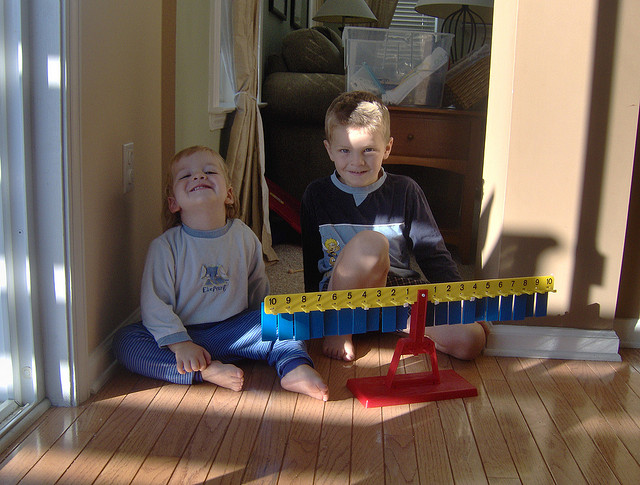
Home Education: A Biblical Perspective
Recently, we asked our readers for some suggested topics. This is the 8th and final post of these suggestions in the month of July. Thank you for the suggestions, and I hope to do this again.
Erin suggested that we write about the Biblical perspective of home education. As many of you know, we homeschool our children. Next Monday, Mary Carol will start first grade, and Turner will start Kindergarten (although we “homeschooled” him last year, too. We just called it “Mommy preschool.”)
The decision we made to do this was after countless hours of prayer, conversations, and thought. We know there are drawbacks, and one of our goals is to lessen those as much as possible. However, for our children, we decided this was the best way for us to handle their education. Also, let me say, that this is something we regularly evaluate. While we plan on homeschooling them throughout all 13 years of school, we understand that this is something that needs to be decided upon yearly, and that each child is different, too. It is always worthy of evaluation.
Further, let me say that homeschooling is not for every family. This is not a salvation issue! We do not think less of families whose children go to public or private schools. Each family needs to decide what is best for their child and they need to work hard in whatever decision they might make.
That said, is there a Biblical reason to educate children at home? I think there is. The reason is that the primary education of children is to be done, by God’s design, by their father and mother.
The ultimate passage on this is Deuteronomy 6, where the education of children was to take place at all times of the day (verses 7-9). The teachings of the Lord were to be passed on to the sons and to the son’s sons. The education was perpetual, but it was primarily centered in the home.
Further, God’s design for the family was that fathers are to “bring up children in the discipline and instruction of the Lord” (Ephesians 6:4). A father may get all the help in the world to do this–especially the help of a faithful, Godly spouse–but he has the primary leadership role to provide both discipline and instruction for his children. When the children are being taught in the parameters of the home, this becomes easier to fulfill.
Are there families who cannot homeschool? Of course. In fact, there are some who do not need to!
But I am thankful that we live in a time where home education is not seen as something totally strange or offbeat. More and more parents are seeing the value in teaching their children about God while at the same time teaching them reading, writing, and ‘rithmetic. It provides parents a way to instill even stronger values under their leadership and love. Ultimately, it also provides parents with more time with their children during those few precious years that they are under their roof.
Will there come a time when one or both of our children are not homeschooled? It is possible. We may decide that a certain type of schooling (whether public or private) is what is best for one or both. But for now, we feel that having both our precious children at home and instructing them that way is what is best. Further, we feel that we have a Biblical basis for doing this, but we feel the weight of doing our very best at it.
After all, if we are doing this for the spiritual development of our children, then we owe it both to them and to our heavenly Father to do our very best!
QUESTIONS: What are some other Biblical reasons to educate children in the home? Also, what are some reasons not to?
——————–
Photo credit: whgrad on Flickr creative commons





5 Comments
Amy C.
Thanks for this article! We are currently the only homeschooling family at our congregation, and the biggest challenge so far has been convincing others that we aren’t judging them for NOT homeschooling. Looking forward to seeing you all again at PTP this year!
Erin
Thank you for your perspective, Adam! I agree with Amy! We have the same challenge.
I also appreciate that you have expressed that your decision is one that is reevaluated each year. I think we all could benefit, public, private, or home educated, if we all saw our choice as one we would constantly consider, rather than just taking for granted that our choice is the correct one, year after year.
Thank you for discussing this sometimes debated topic. Do you have any specific ways that your family implements a biblical world view (other than bible, that is a given) within your homeschool?
My husband asked me the same question and was surprised to learn that math is our only “non-biblical” subject. Do you use a specific curriculum?
Thanks again!!!!!
Erin
In response to your questions above:
Other reasons to:
1) Negative peer influence (1 Cor 15:33)
2) Sitting at the feet of teachers who may not have respect or the love of the Lord. ( I can attest that not all are this way, I have known many wonderful, godly teachers and admins….Also, I once taught public school.) (Psalm 1:1-2) (Luke 6:40)
3)False information given about creation, dinosaurs, etc….. I can remember as a high school student batting back and forth the doubts that had been placed into my heart about these things, which, in turn, allowed the devil a foothold in my life. I had teachers who did not teach these things as fact, but the information was still there for me to read and think about. In most textbooks, these ideas are NOT presented as theory and no other alternatives are given, i.e. biblical world view. I do not want lies presented as fact to my kids.
Biblical reasons NOT to homeschool:
The only one that I have ever heard is that people want their children to ” Be the light of the world.” Salt and light……..
The point is taken but I am not sure the passage that is cited is speaking of young children, rather people who are already Christians. Please correct me if I am wrong on this. If I am, then it is a valid argument.
These are just a few of my thoughts….. Not claiming to be right or to bind my conviction upon anyone.
Adam Faughn
We use My Father’s World to tie together the Bible and other subjects.
Also, I think the salt and light is a good reason not to homeschool. There is something to be gained from standing on one’s own faith. However, that does not mean it has to be done in very young years. I think that part is very much a parental judgment call.
Thanks for commenting.
Erin
Ok, I can see that I was wrong in my earlier statement about the light of the world. Jesus was speaking to His disciples and others who were gathered there. While these people were not “christians” , many were seeking Christ and were following Him. I see that I was having a “duh” moment. I wish I had reread the passage before talking about it. Sorry, guys!!!